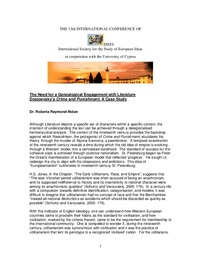The Need for a Genealogical Engagement with Literature Dostoevsky’s Crime and Punishment: A Case Study

View/
Date
2012-07Author
Raymond-Nolan, Dr. RobertaSource
THE 13th INTERNATIONAL CONFERENCE OF ISSEI (International Society for the Study of European Ideas)Google Scholar check
Keyword(s):
Metadata
Show full item recordAbstract
Readers often approach texts as artifacts, metaphors for a regimented history that has already occurred and that has been crystallized into the present concept of progress. This paper suggests that Literature must be examined as a tool to cognitively access an instant of the reader’ s being-in-time, through a dialectical investigation and communion with the authors indication of ideas that are not within our physical purview. The intellect must be challenged to consider stretched time so that the distinction of time labels can no longer instrumentalise the discussion of deregionalised ideas. This paper strives to reveal ideas that are permeating 19th century Western Europe, as they are reflected in Dostoevskys Crime and Punishment. The text will act as a case-study exemplifying the need for a genealogical engagement with fictional texts as possible documents of historiography.
